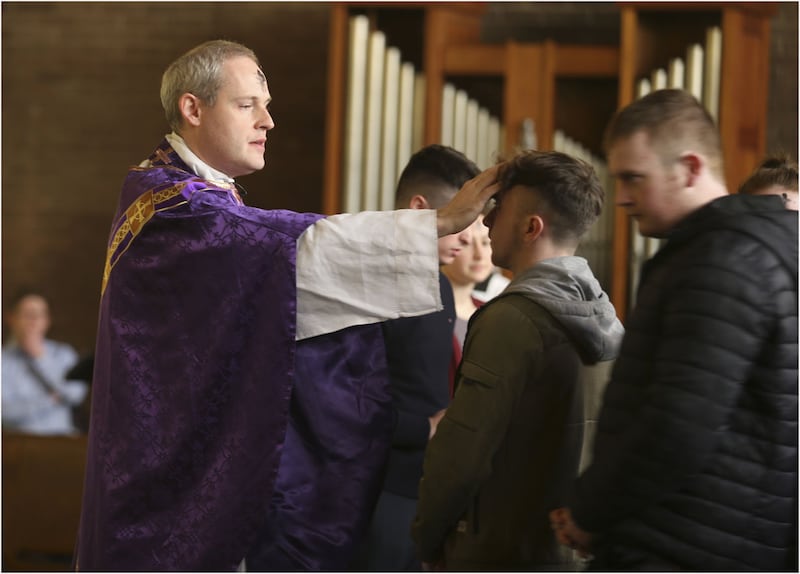
LENT can be a little like New Year. In some senses, both have a penitential flavour to them, albeit driven by quite different motivations: January's 'new year, new you' becomes Lent's 'return to the Lord'.
We start with great intentions to clean up our life - giving up those things we have determined enjoyable but which are bad for us, or taking up habits we consider good for our body or for our soul.
We might resolve to fast from social media, chocolate, coffee, alcohol, cigarettes - insert your favourite poison...
Alternatively, we might commit to attending daily Mass, making time for prayer or Bible reading, giving to charity - insert your chosen virtue...
Of the many possibilities we might consider, drawing closer to God needs to be at the heart of our living of Lent.
The forty days of Lent are a graced time, an opportunity to satisfy our thirst for God, a chance to rediscover the gift of relationship with God that is offered to us and to explore how this gift is manifest in our lives - through friends, family, those we meet, the world around us; in the events of our daily lives; in our experiences of love, joy, suffering, sorrow, forgiveness.
Deepening our relationship with God is something we all desire but, as with new year resolutions, we can quickly fall by the wayside during Lent once the initial fervour wears off and our excuses begin to sound increasingly reasonable and valid.
Mindful of this prospect, what I suggest might seem easy and even a bit unoriginal.
In some sense, this is true and deliberately so. But aware of how vital our prayer life is in connecting us to God, perhaps we might take it seriously and make a real effort to sustain our commitment to this one challenge this Lent.
Deepening our relationship with God is something we all desire but, as with new year resolutions, we can quickly fall by the wayside during Lent once the initial fervour wears off and our excuses begin to sound increasingly reasonable and valid.
I propose praying St Luke's version of the Our Father, as recorded in Luke 11 - just one line each day, and persevering in praying this way throughout Lent.
To engage in daily prayer is not a novel suggestion. Neither is it a practice that becomes a part of our life only during this season of Lent.
Yet, this is not a typical praying of the Our Father. This is not a rattling off of the Our Father, but a careful, meditative praying of it - line-by-line, day-by-day - and of considering its implications for our lives - for how we live as prayers, for how we might become that prayer in our daily lives.
It is praying in a manner that permits our prayer to change us. It is to persevere in prayer as Jesus teaches us to do.

So what might praying the Our Father mean for us?
This Gospel passage opens with an intriguing request from Jesus' disciples: "Lord, teach us to pray."
Perhaps they ask this because they hope to become more like Jesus, to learn to approach God in the way they see Jesus doing.
Whatever their motivation, Jesus responds positively.
The disciples do not learn specific words for reciting by rote.
Instead, Jesus teaches them about relationship with God.
He offers guidance on how to pray and what to pray for, on the importance of perseverance and on the effectiveness of prayer.
What Jesus teaches the disciples is interesting in terms of how we might pray and how we might live as followers of Jesus today.
Most Christians pray these words often, many at least once daily and, quite possibly, unthinkingly.
What do they demand of us? How can this prayer change us?
The forty days of Lent are a graced time, an opportunity to satisfy our thirst for God, a chance to rediscover the gift of relationship with God that is offered to us and to explore how this gift is manifest in our lives
"Our Father": Jesus begins with an invitation to recognise God as 'Father' and to form a personal relationship with God who is Father of all.
On the day when you pray this line, reflect perhaps on your relationship with God.
Consider too your relationship with others, who are also children of God, for whom God is also Father.
Recognising that God's love is universal can give us pause to think, to take note of how we judge others, how we may parcel out God's love, or ration who God's love extends to.
To pray "may your name be held holy" is to commit to living well, to doing nothing that detracts from what keeps God's name holy.
Our lives must be such that they point to God and in a wholesome manner.
Praying "your kingdom come" is also challenging. How do we discover God's will?
Having done so, how do we do work to bring about God's kingdom?
The kingdom we pray for does not mean an easy life and yet it is simple.

It starts with relationship with God and asks everything of us, as it did of Jesus and, later, as it did of the disciples.
Only after God has been addressed, "Give us this day..." is Jesus' way of praying concerned with earthly realities.
Asking that God "give us each day our daily bread" recognises both that we can rely on and trust in God's providential care and that we are not the master or mistress of our own destiny.
Consequently, we have no need to worry about or amass those things that we need.
To pray "forgive us our sins, for we ourselves forgive each one who is in debt to us" is audacious.
Without putting conditions on God's forgiveness, Jesus' words have us asserting boldly that forgiving our brothers and sisters is already our way of being.
If it is not, it may give us pause in asking this of God until we amend our relationships with others.
Praying "do not put us to the test" looks to the eschaton, the end times.
It is to trust that God will continue to aid us in remaining faithful when we meet with the difficult challenges expected in the end times.
Encouraged by Jesus' teaching, may we call on the Lord continually, confident that God our Father will answer.
Similar to the adage, 'Be careful what you wish for, you might just get it,' one might well caution, 'Be careful what you pray for'.
To pray in the manner that Jesus teaches will ask much of us and may cost us everything.
May we persist in such prayer so that, though our lives, we might offer others a glimpse of God's kingdom and of God's love.
Inspiring stories of people who have done just this are everywhere.
Not all are confessed Christians but nevertheless their lives reflect Gospel values and bring the kingdom of God closer.
Some are arrested or imprisoned for doing so, others tortured or killed. As their lives make clear, God gives us many opportunities to keep God's name holy and to strive for the coming of God's kingdom.
Let us seek for and seize these opportunities with both hands. Jesus teaches us to pray for this, and our world needs us to do so: to live as disciples who have been taught 'how to pray' in deed as much as in word.
How will you live the Gospel this Lent? How will you grow in holiness? How will your life bring the Kingdom nearer?

Sr Eileen O'Connell OP is a member of Dominican Convent, Falls Road and Assistant Catholic Chaplain to Queen's University, Belfast.

The Catholic Chaplaincy in Queen's University, Belfast will explore further the theme of prayer in its Lenten Mission - Say it to God: Reimagining Prayer this Lent.
It will start at 7pm on Tuesday March 3 and continue on Wednesday March 4 and Thursday March 5.








